

Eli Pariser's 'The Filter Bubble: What the Internet Is Hiding from You' explores the profound impact of personalization algorithms on our online experiences and the broader implications for society and democracy. Pariser...
Continue readingIn 'The Filter Bubble', Eli Pariser discusses how personalization algorithms shape our online experiences. These algorithms analyze our behavior, preferences, and interactions to curate content that aligns with our inter...
Continue readingPariser highlights the illusion of control that users believe they have over their online experiences. Many people think they can curate their own content by adjusting settings or following specific pages. However, the u...
Continue readingThe concept of echo chambers is a central theme in 'The Filter Bubble'. Pariser explains how the internet can create environments where individuals are only exposed to information that aligns with their pre-existing beli...
Continue readingPariser argues that the filter bubble has far-reaching implications for society and democracy. By limiting exposure to diverse viewpoints, the algorithms can contribute to a less informed populace, which is detrimental t...
Continue readingIn 'The Filter Bubble', Pariser discusses the role of users in navigating the complexities of the digital landscape. He emphasizes that while algorithms play a significant role in shaping our online experiences, users al...
Continue readingPariser delves into the business model of attention that underpins many online platforms. He explains how companies prioritize user engagement and retention, often at the expense of content quality and diversity. The com...
Continue readingIn the concluding sections of 'The Filter Bubble', Pariser offers potential solutions to address the challenges posed by personalization algorithms and filter bubbles. He advocates for greater transparency from tech comp...
Continue readingThe reading time for The Filter Bubble depends on the reader's pace. However, this concise book summary covers the 7 key ideas from The Filter Bubble, allowing you to quickly understand the main concepts, insights, and practical applications in around 21 min.
The Filter Bubble is definitely worth reading. The book covers essential topics including Personalization Algorithms, The Illusion of Control, Echo Chambers and Polarization, providing practical insights and actionable advice. Whether you read the full book or our concise summary, The Filter Bubble delivers valuable knowledge that can help you improve your understanding and apply these concepts in your personal or professional life.
The Filter Bubble was written by Eli Pariser.
If you enjoyed The Filter Bubble by Eli Pariser and want to explore similar topics or deepen your understanding, we highly recommend these related book summaries:
These books cover related themes, complementary concepts, and will help you build upon the knowledge gained from The Filter Bubble. Each of these summaries provides concise insights that can further enhance your understanding and practical application of the ideas presented in The Filter Bubble.